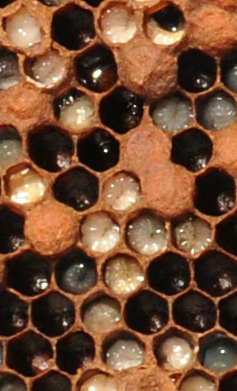- Author: Kathy Keatley Garvey

Not to worry. Put it all in perspective by thinking about the larvae of the honey bee.
Extension apiculturist Eric Mussen of the UC Davis Department of Entomology, likes to talk about the massive weight gain that occurs during the larval stage of the honey bee. He speaks at scores of beekeeping functions throughout the year and what he says about the larval weight gain always draws a "Wow!" or "Incredible!" or "Amazing!"
"A honey bee egg weighs about 0.1 mg," Mussen says. "The first stage larva weighs the same. Over the next six days of larval life the larva goes from 0.1 mg to around 120 mg. It defecates once, just before pupating, and the resulting adult bee weighs around 110 mg. Thus, the new bee weighs about 1,000 times the weight of the one-day-old larva."
Now get this:
"If a human baby, weighing eight pounds at birth, were to grow at the same rate, the baby would weigh 8,000 pounds, or 4 tons, at the end of six days."
Four tons in six days? Fortunately, what goes on with Apis mellifera does not apply to Homo sapiens.
Now go get that second helping of pumpkin pie.
As for Mussen, he quips: "I only feel that heavy some days!"






